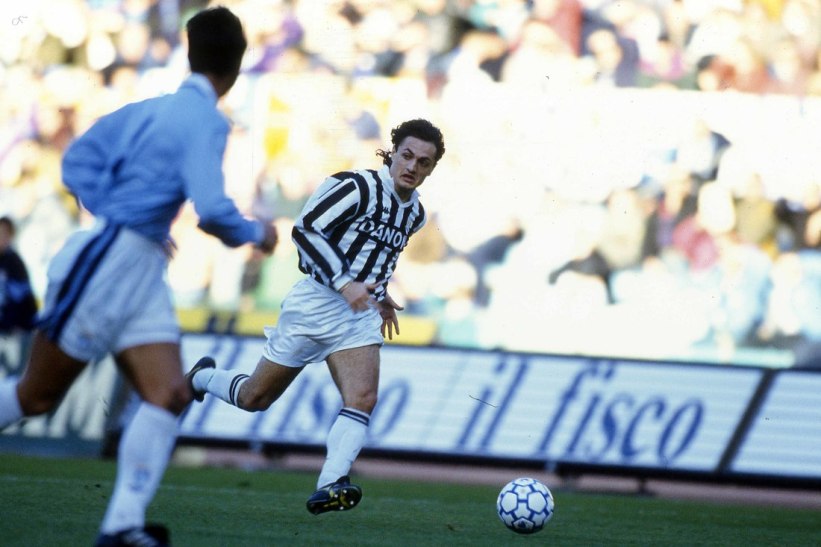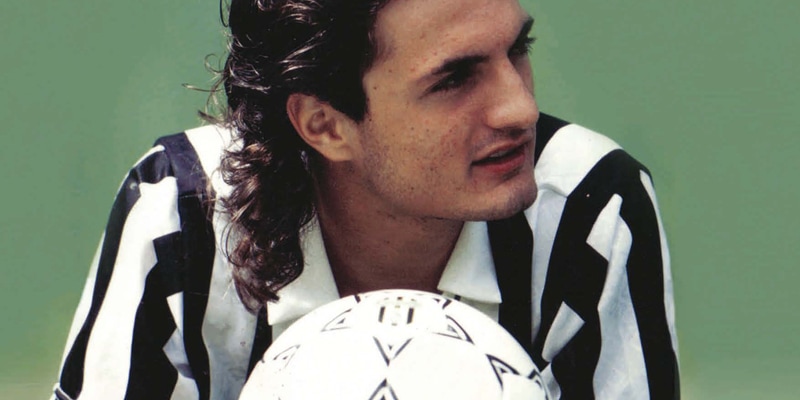To look at him, he was the picture of health. Young, athletic and, most importantly, a starter for Juventus; there was no reason to doubt that everything was perfect in his world. Yet appearances can be deceiving and even one who appeared as healthy as Andrea Fortunato can carry in him a tragic secret.
Fortunato was born at the Southern tip of Italy, in Salerno. It was there that he picked up football before moving to the North of the country – to Como – when he turned 13. It is a journey that many young hopefuls make, yet there is very little that is typical about this move. Fortunato was not like the many others looking to escape from the poverty of his surroundings as his was a very middle class family with a cardiologist father and a librarian mother. Nor was he looking to escape from school, which he kept working hard at even long after he had proven his worth as a player, earning a degree in accountancy.Instead, his was a decision fuelled almost entirely by ambition and the desire to test himself in a different environment.
Not every 13-year-old has a character that is strong enough to withstand the pull of homesickness and a family far away. Andrea Fortunato, however, was not like most others. Within five years of making the trip north, he had shown enough to make his debut in the Serie B. It was a terrible season for Como with problems both on and off the pitch that eventually led to relegation. Three managers tried to pull the club away from the brink – Giempiero Vitali, Gigi Galeone and Angelo Massola – but they failed to avoid back-to-back demotions.
It was the first one of those three who handed Fortunato his first appearance on 29 October, 1989, but the others also recognised his talent and amid all the chaos, he went on to play on 15 other occasions during that season.
Those were only the prelude for the following season, where yet another manager (the experienced Eugenio Bersellini) quickly appreciated Fortunato’s ability, making him a starter and a regular for most of the season. His tenacity, speed and maturity at left-back promptly caught the eye of much bigger clubs and, with Como stuck in the Serie C, his future clearly lay elsewhere.
Specifically, it lay at Genoa where, club president Aldo Spinelli agreed to pay Como’s asking price so that the young full-back could bring depth to his squad. This was one of Genoa’s happiest periods in their recent history, having just qualified to the UEFA Cup where they would eventually make it all the way to the semi-finals.
Fortunato, however, played no part in that run. His opportunities, already restricted by the presence of the Brazilian big-hitter Branco, were further reduced following a pre-season run-in with assistant manager Sergio Madde. This meant another, unexpected move, joining Pisa on loan and spending a season in Serie B.
To an extent, all of that worked to Fortunato’s advantage, as another year’s experience helped him develop far more than a season spent watching from the sidelines. By the time he returned to Genoa, Osvaldo Bagnoli had left for Inter together with his coaching staff and Fortunato quickly won over the new manager Bruno Giorgi.
33 appearances and three goals in his debut Serie A season proved that the new man had made the right choice with Fortunato proving to be one of the finest young defenders around, along with his Genoa team-mate Christian Panucci.
Juventus, always a club quick to pick up young talent, were interested in buying both, but Panucci instead opted to join AC Milan, where he would go on to win everything there was to win.
For Genoa’s owner Spinelli, that sale was enough to balance the books and he informed Juventus that Fortunato wasn’t available. Then, urban legend has it, with the club veering dangerously close to the relegation zone, he approached the young full-back promising him a transfer if he helped the side avoid demotion.
Fortunato did just that and so, in the summer of 1993, he was paraded as a Juventus player and the heir to Antonio Cabrini. Following in the footsteps of a player who had achieved so much is often a crippling burden, yet Fortunato had shown over and over his strength of character. And so, within weeks of putting on the Bianconeri shirt, he had proven his worth so much that by September, he was also pulling on another shirt, the Azzuro of the national team, taking the place of none other than Paolo Maldini.
 Fortunato in action against Lazio during the 1993/94 season
Fortunato in action against Lazio during the 1993/94 season
It is often impossible to say if a young talent will keep on developing, but with Fortunato there were few doubts: this boy was going to be big.The human mind is built to recognise patterns; it is the basis of our understanding of the world around us. This internal programming makes it even harder, then, to equate an athletic young man with disease. So, when Fortunato put in a series of lethargic performances towards the end of that first season with Juventus, people simply assumed that it was either a case of a player tiring out after an intense campaign at a level he was not used to or, far less charitably, that he wasn’t putting in the effort because he thought that he had made it.
Not everyone felt that way, however. Certainly not the Juventus medical staff, who immediately ordered a whole battery of tests. The result was chilling: a rare form of Leukaemia.
Fortunato had youth and athletic strength on his side, the doctors said. Yet he needed a bone marrow transplant and finding a suitable donor was hard. The first transplant came from his sister Paola but, when this proved to be unsuccessful, the doctors turned to Andrea’s father.
This time the transplant seemed to work. Andrea seemed set for a full recovery and by February of 1995, he even seemed set to return to the Juventus squad for the away game at Sampdoria. In the end, he had to make do with watching his team-mates from the stand. That would prove to be the closest he got to a return.
A few weeks later Fortunato came down with the flu that quickly turned to pneumonia. His body was too weak to fight back and on 25 April he passed away in a hospital in Perugia. Fortunato was 23 years old.
His funeral was held in Salerno, the city of his birth. His Juventus team-mates were among those present, shocked and heart-broken that the team mate that they had waited to see back in the side was no longer with them.
“Let’s hope that in heaven there is a football team so that you can be happy once again chasing after a football,” Gianluca Vialli, said during the homily, visibly struggling against breaking down in tears.
“Onore a te, fratello Andrea Fortunato.”
Less than a month later, Juventus won the league title which was promptly dedicated to their former teammate. Fortunato’s Scudetto, they called it. It was their 23rd scudetto.

